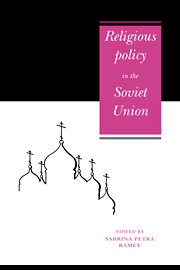Book contents
- Frontmatter
- Contents
- Notes on contributors
- Preface
- Part I Introduction
- Part II Policy apparatus
- Part III Education, socialisation, and values
- Part IV Cults and sects
- Part V The world of Christianity
- 12 The Russian Orthodox Renovationist Movement and its Russian historiography during the Soviet period
- 13 The re-emergence of the Ukrainian (Greek) Catholic Church in the USSR
- 14 Protestantism in the USSR
- 15 Epilogue: religion after the collapse
- APPENDIX: Religious groups numbering 2,000 or more, in the USSR
- Index
14 - Protestantism in the USSR
Published online by Cambridge University Press: 03 December 2009
- Frontmatter
- Contents
- Notes on contributors
- Preface
- Part I Introduction
- Part II Policy apparatus
- Part III Education, socialisation, and values
- Part IV Cults and sects
- Part V The world of Christianity
- 12 The Russian Orthodox Renovationist Movement and its Russian historiography during the Soviet period
- 13 The re-emergence of the Ukrainian (Greek) Catholic Church in the USSR
- 14 Protestantism in the USSR
- 15 Epilogue: religion after the collapse
- APPENDIX: Religious groups numbering 2,000 or more, in the USSR
- Index
Summary
By the summer of 1990 Soviet Protestant church leaders were heard to say that they often felt literally torn apart by persons coming to them from all sides to ask questions about faith. A villager, for example, would ask the evangelicals in a nearby city to visit his village, bring along a group of singers and a speaker. Vice-President Alexei Bychkov and editor Vitali Kulikov of the Baptist Union found themselves invited to give ten minute sermons on Moscow radio on a monthly basis. When in June 1990 the Baptist Union called a national consultation of evangelists, pastors from all over the Soviet Union reported invitations they were receiving to speak to university professors, or to their classes, to lecture on Christianity at nearby institutions of higher learning. When many of them expressed their insecurity at addressing the educated of society, Nikolai Kolesnikov responded by reminding them of the intent of those invitations. Those inquirers knew that these poorly trained pastors or simple church members claimed to have a personal relationship to Jesus Christ, and that was what they wanted to hear about, not a scholarly dissertation on the nature of transcendance or proofs for the existence of God. Their task was to explain what difference their faith in Christ made in their lives.
The process of evangelisation was in essence a becoming acquainted with the nature of the Gospel; all Christian confessions were involved in explaining their faith to seekers. Many of the converts were individuals who now chose to make public their earlier secret belief; others responding with requests for baptism to the Christians that they met.
- Type
- Chapter
- Information
- Religious Policy in the Soviet Union , pp. 319 - 349Publisher: Cambridge University PressPrint publication year: 1992
- 2
- Cited by

